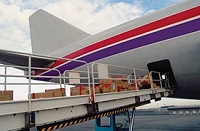IATA and UPU warn of air capacity shortage for postal traffic

The International Air Transport Association (IATA) and the Universal Postal Union (UPU) have warned that air capacity for postal services is insufficient and urged governments to do more to support the movement of mail by air during the COVID-19 crisis.
“Owing to the drastic 95% reduction in passenger flights, which are typically used to transport mail, and a 25-30% increase in demand for e-commerce as customers and businesses resort to online purchasing in response to social distancing restrictions, postal administrations are facing a challenge in sending and delivering international mail, in particular, cross-continental mail,” they said in a joint statement.
IATA and UPU are calling on governments to facilitate the flexibility that airlines need to meet this “critical” demand by removing border blockages to ensure trade flows continue, avoiding unnecessary regulations and fast tracking the issuance of permits for chartered operations. Additionally, ensuring adequately trained staff are available to process and clear the mail upon arrival is essential.
IATA and UPU are also working to support posts’ use of cargo flights in addition to commercial passenger flights by providing information on the airlines and cargo carrier status, available new alternative routes and best practices.
“Airlines have been required to cut passenger services in the fight to stop the spread of COVID-19. So, it’s vital that everything is done to support the smooth movement of mail which is an important component of society,” said Alexandre de Juniac, IATA’s Director General and CEO.
For his part, UPU Director General Bishar A. Hussein, commented: “Posts are trusted partners in the delivery of goods, vital medical supplies and essential information on the pandemic. The cancellation of more than 4.5 million passenger flights – the primary means of transporting post - has meant that capacity is scarce, costs more and takes longer. Action needs to be swiftly taken to address the shortfall in air cargo capacity and to keep the mail moving.”
The statement underlined that G20 governments, at their recent emergency meetings, made a commitment to minimizing disruptions to trade and global supply chains and identified the need to prioritize keeping air logistics networks open and functioning efficiently.
Posts and airlines are cooperating to meet this priority by ensuring that reliable operations continue throughout the pandemic, it added.
Air cargo traffic slumped over 15% in March
Meanwhile, IATA's latest monthly traffic figures showed that in March, global demand, measured in cargo tonne kilometres (CTKs), fell by 15.2% compared to the same month previous year (-15.8% for international markets). Global capacity, measured in available cargo tonne kilometers (ACTKs), shrank by 22.7% compared to March 2019 (-24.6% for international markets).
International markets account for 87% of air cargo. Belly capacity for international air cargo shrank by 43.7% in March compared to the previous year. This was partially offset by a 6.2% increase in capacity through expanded use of freighter aircraft, including the use of idle passenger aircraft for all-cargo operations.
“At present, we don’t have enough capacity to meet the remaining demand for air cargo. Volumes fell by over 15% in March compared to the previous year. But capacity plummeted by almost 23%. The gap must be addressed quickly because vital supplies must get to where they are needed most,” de Juniac underlined.
“For example, there is a doubling of demand for pharmaceutical shipments that are critical to this crisis. With most of the passenger fleet sitting idle, airlines are doing their best to meet demand by adding freighter services, including adapting passenger aircraft to all-cargo activity. But mounting these special operations continues to face bureaucratic hurdles. Governments must cut the red tape needed to approve special flights and ensure safe and efficient facilitation of crew,” he said.
Passenger planes operate cargo-only flights
IATA's Head of Cargo, Glyn Hughes, highlighted the key role passenger 'freighter' aircraft were playing in response to the severe cargo capacity crunch affecting markets during a webcast last month organised by cloud-based logistics software provider Transporeon and its subsidiary Tim Consult.
He said there were currently close to 50 airlines now operating around 300 pax aircraft in all-cargo mode. “The majority of [the aircraft] are operating without modification. So, it's really a case of cargo in the belly, under the seats and in the overhead bins.”
With little prospect of a significant return in passenger traffic in the foreseeable future, pax aircraft are likely to continue operating in cargo-only mode for some time yet, according to Hughes. “There is demand for cargo space around the world and a need for more capacity,” he added.
Asked about the squeeze on space driving up rates, Hughes replied that IATA was encouraging governments to facilitate requests from airlines to operate pax aircraft as freighters to help re-establish price stability and increase capacity for the transport of urgent medical supplies as part of the COVID-19 relief effort.
“A number of countries have refused applications from carriers to operate passenger aircraft in cargo configuration,” he said. “They said, ‘No, no, no, we don't want to have those here.’ “Then the national carrier of one country said, 'Actually, we would like to do that' and the state authorities relaxed their position.
“Now we think that's unacceptable. The state in question is actually applying a protectionism approach to what are the considerations of a global society in terms of human and patient safety. So we're advocating very strongly that all states be very sympathetic when carriers want to put cargo out there because it'll help bring back an equilibrium between supply and demand.”
Hughes added that current pricing trends were “indicative of the fact that there needs to be more capacity out there. And the [airline] industry is working to get that capacity flying.”
In a related development, postal operators last month began using mail-only freight trains from China to help clear huge backlog of mail destined for Europe – caused by the huge cuts in passenger airline belly cargo capacity – and deliver medical supplies.

